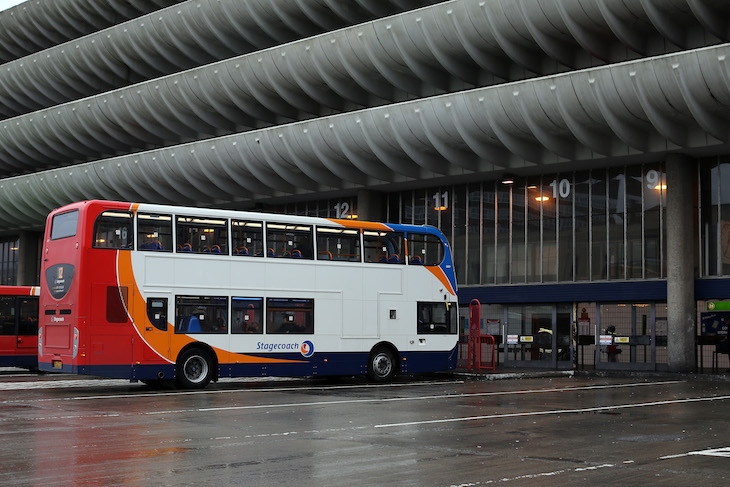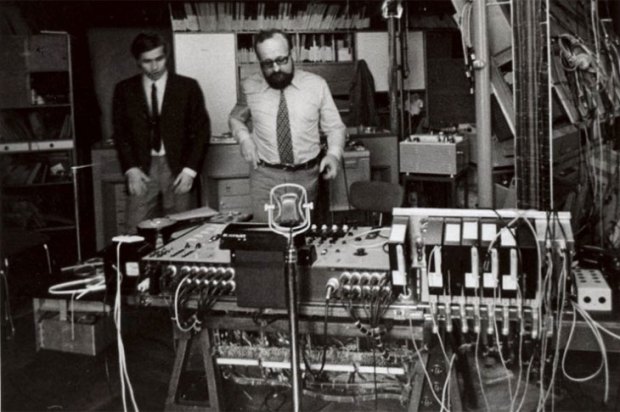It’s a pity Will Self didn’t embark on his bus tour round Britain before the Brexit vote. If he had, we might have all had a better understanding of what’s going on in the shires. In his series of ten short programmes on Radio 4, Great British Bus Journey (produced by Laurence Grissell), Self sets out to emulate Daniel Defoe, William Cobbett and J.B. Priestley by taking the bus not to the big centres of life in the UK but those smaller towns and cities we often rush past on the motorway or have no reason to add to our bucket list. Places like Plymouth, Preston, East Kilbride, Wolverhampton and Swansea.
His big question is to find out what it means to be British today (the intention behind those earlier cross-country trips by horse and chauffeur-driven car). But actually far more interesting are his by-the-way observations and offbeat conversations with strangers encountered on the way. In Devonport, for instance, once ‘the cockpit’ of Britain’s strategic power, he takes a late-night walk and comes across 30 homeless people clustered round a mobile food van. Demand has gone up 10 per cent in the past year, one of the customers being a young man who came out of jail 15 months ago and has been homeless for the past nine. He really does want to reform his life but can’t find a job. The organiser says that Plymouth has a very organised soup run, there’s a real community spirit. But she also explains that she was not allowed to park the van by the main road into Devonport and had to move it further down a side road. ‘Is this what it means to be civic-minded in contemporary Britain?’ says Self, adding with sonorous cynicism, ‘keeping things out of sight.’
In Wolverhampton he can’t resist pointing out the irony of a centre for those without jobs being funded partly by the National Lottery and partly by the European Social Fund. On his way to the centre he passes lots of newsagents and corner shops advertising lottery tickets. The people using the centre, 900 of them at least, are part-funding it themselves with their weekly habit of gambling on £1 scratchcards.
Yet Self sounds a lot more upbeat than usual, as if he’s really enjoying his meetings with people who love where they live, and he’s ‘entranced by the facility and fluidity of contemporary British bus travel’. Timetables may be a work of ‘speculative fiction’, but the usually short-fused Self appears remarkably composed after hitting ‘a spot of traffic’. He’s also very excited by the sight of Preston’s bus station, a Grade II-listed brutalist building from the 1960s. ‘Awesome,’ he declares.
We were also taken back to the 1960s on Saturday night when Julian Pettifer, the veteran reporter, relived his experiences in Vietnam 50 years ago. He was in Saigon on the night of 30 January 1968 when the Tet offensive (named after the Vietnamese new year) began with an audacious raid on the US embassy. In Back to Vietnam, also on Radio 4 (produced by Melissa FitzGerald), we heard clips from his reports, peppered with gunshot and the panicky shouts of those trying to avoid it. Pettifer and his cameraman were trapped behind a tree for several hours, knowing that beside them for all that time was an American jeep whose driver had been killed, a young, red-headed man whose spectacles were smashed against his nose.
One of Pettifer’s colleagues was a youthful Martin Bell, who confessed to being much less cynical than Pettifer. He attended the daily Five o’Clock Follies, so-called because these briefings from the US state department to journalists held in a former cinema were notoriously slippery with the truth. At first, Bell accepted what he was told, but now knows, ‘I got it completely wrong.’
The Tet offensive was the ‘cultural watershed’, says Pettifer. If their own embassy in Saigon was under attack, how could they be winning the war, demanded the American public. Never again would journalists be given so much licence to report. Never again would voters feel quite the same confidence in what they were being told by their politicians. You could, by extension, suggested Pettifer, blame the Tet offensive for our current state of entropy and distrust.
If this all becomes too depressing, Radio 4’s Something Understood on Sunday morning (produced by Frank Stirling) gave us reason to be cheerful. Mark Tully was looking at the work of Julian of Norwich, the 14th-century writer and mystic, whose words have inspired contemporary composers such as Roxanne Panufnik and Stephen Yarbrough. How can a medieval woman who lived her adult life holed up in an anchorite cell attached to a church in Norwich have anything to say to us today? Tully decided it was all to do with her optimism, and her belief that everything in the world is in God’s hands and suffused with his love, even the hazelnut held in the palm of her hand. She knew suffering, having almost died as a teenager, and learned from it how to comfort others. ‘All shall be well… and all manner of things shall be well’ is perhaps her most famous quotation; something that has got me through many a wide-awake night.
Got something to add? Join the discussion and comment below.
Get 10 issues for just $10
Subscribe to The Spectator Australia today for the next 10 magazine issues, plus full online access, for just $10.
You might disagree with half of it, but you’ll enjoy reading all of it. Try your first month for free, then just $2 a week for the remainder of your first year.














Comments
Don't miss out
Join the conversation with other Spectator Australia readers. Subscribe to leave a comment.
SUBSCRIBEAlready a subscriber? Log in